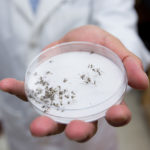
Pest control
By Jeff Carlton and Jan Jarvis At a glance The threat Mosquitos, ticks and other biting arthropods can transmit serious diseases to humans, ranging from West Nile virus to Lyme disease. The response UNTHSC researchers are seeking better preventative agents and more effective monitoring systems to counter these nasty disease-carriers. The bottom line Because... Read more »
Dec 1, 2016








